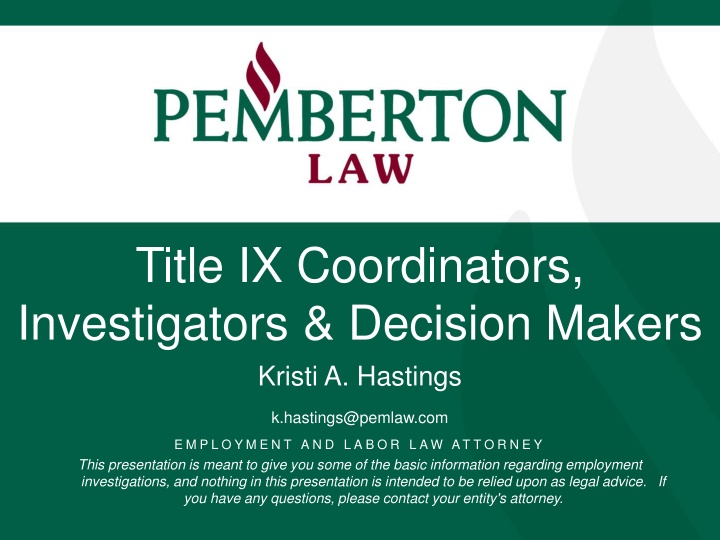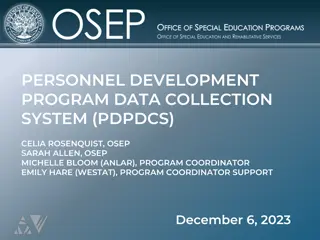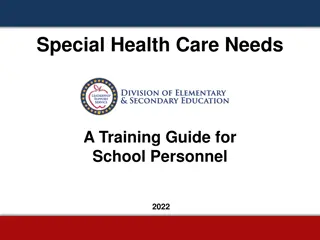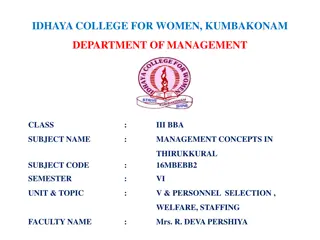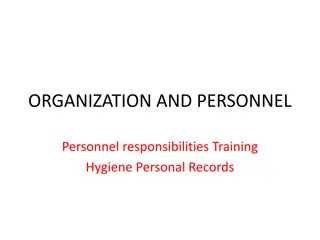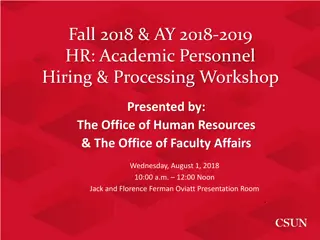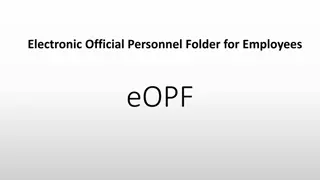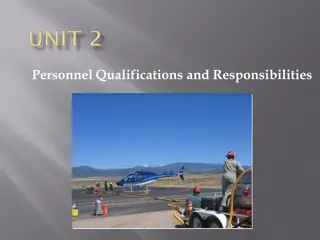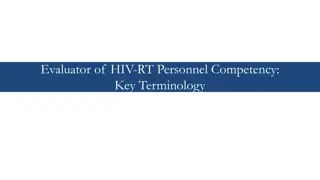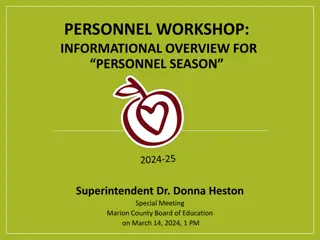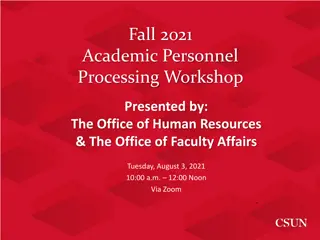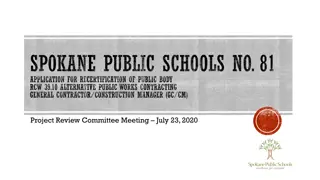Employment Investigations: Title IX Coordinators, Investigators, and Decision Makers
This presentation provides basic information on employment investigations, focusing on the roles and procedures of Title IX Coordinators, Investigators, and Decision Makers. It covers important aspects such as handling formal complaints, mandatory and permissive dismissal criteria, and the philosophy guiding the process.
Download Presentation

Please find below an Image/Link to download the presentation.
The content on the website is provided AS IS for your information and personal use only. It may not be sold, licensed, or shared on other websites without obtaining consent from the author.If you encounter any issues during the download, it is possible that the publisher has removed the file from their server.
You are allowed to download the files provided on this website for personal or commercial use, subject to the condition that they are used lawfully. All files are the property of their respective owners.
The content on the website is provided AS IS for your information and personal use only. It may not be sold, licensed, or shared on other websites without obtaining consent from the author.
E N D
Presentation Transcript
Title IX Coordinators, Investigators & Decision Makers Kristi A. Hastings k.hastings@pemlaw.com E M P L O Y M E N T A N D L A B O R L AW AT T O R N E Y This presentation is meant to give you some of the basic information regarding employment investigations, and nothing in this presentation is intended to be relied upon as legal advice. If you have any questions, please contact your entity's attorney.
Philosophy Treat Complainants and /Respondents equally or equitably. Objectively evaluate the evidence. Presume the Respondent is innocent until proven guilty. Set reasonable timeframes. Distribute your Title IX policy early and often.
Four Positions 1. Coordinator 2. Investigator 3. Determination of Responsibility (Decision Maker) 4. Appeal Decision Maker
Formal Complaint Begins the process. Develop a form to have on hand. A formal complaint must be signed by the complainant or by the Title IX Coordinator. Coordinator must immediately evaluate whether the complaint is in the proper form to move forward, or whether it must be dismissed.
Mandatory Dismissal The conduct as alleged does not meet the definition of sexual harassment as defined by the regulations. The conduct as alleged did not occur in the school or the school s education program or activity. The conduct as alleged did not occur against a person in the United States. Give written notice to Complainant listing one of the reasons above as the basis for dismissal.
Permissive Dismissal If/when the Complainant changes their mind and notifies the Coordinator (in writing) that they wish to withdraw their complaint. The subject/respondent is no longer a student at the school or is no longer an employee of the school. When specific circumstances prevent the school from gathering evidence sufficient to reach a determination as to the complaint. Give written notice to Complainant listing one of the reasons above as the basis for dismissal.
Post-Dismissal Make sure that if you do dismiss a complaint as a Coordinator, that you consider other reporting requirements or other policies that the complaint may fall under: o Maltreatment report to law enforcement or social services? o Protected class harassment or discrimination? o Criminal violations? o Code of Conduct violations?
Notices If the complaint is not dismissed up front, then the Coordinator will have to send out a written notice. TO: Complainant and Subject/Respondent (separately). INCLUDE: Summary of allegations and a statement that the subject/respondent is not presumed to be guilty. NOTIFY: Notify parties of their right to have an advisor and the requirement to be honest (reference your Code of Conduct policy if you have one). ATTACH: Title IX Policy (which must include the grievance process).
Supports The parties, both the Complainant and the Subject/Respondent must be offered equal access to supports. The supports cannot be disciplinary or punitive in nature. Examples: o Increased security o Changes to work locations o Mutual no contact agreements o Counseling o Time extensions o Modified work schedule
Student Respondent Take into account IEP/504 Plan considerations before changing a student s placement. Look at class schedule, activities, and transportation to develop a plan to avoid each other during investigative process. Students can be given behavioral directives as long as they still have access to FAPE.
Employee Respondent An employee can be given a directive not to have contact with a Complainant while the investigation is pending. o Develop work plan directives looking at the Complainant s class or work schedule so that the two do not encounter each other during the day, if possible. For union employees, offer the employee the right to have a union representative present when the directive is delivered.
Complainants Identity Complying with the new Title IX regulations is an exception to FERPA. If a Title IX Coordinator signs a formal complaint of sexual harassment, the Complainant s identity MUST be provided to the Respondent. The Complainant cannot remain anonymous.
Unbiased and Objective ob jec tive / b jektiv/ Adjective (of a person or their judgment) not influenced by personal feelings or opinions in considering and representing facts. "historians try to be objective and impartial"
*New Requirements The parties must have an equivalent opportunity to provide and review evidence. The parties must be provided all the evidence subject to inspection and review in electronic format or hard copy before the investigative report is complete. The parties must be given 10 days to submit written responses and the investigator must consider written responses before finalizing report.
*New Requirements Prior to the interview of the Complainant or Respondent, the Coordinator must give written notice that includes: o Date, time, and location of interview o List who will participate in the interview o The purpose of the interview/meeting/hearing o Must provide sufficient time for the party to prepare or participate
*New Requirements Investigative reports that summarize the relevant evidence must be sent to the parties 10 days before any determination of responsibility is made. This is different from the prior 10-day timeframe. This opens the door for another opportunity for the parties to submit information and respond.
Preserve Evidence During investigation o Documents o Social media screenshots o Email and system data o Employer-issued devices o Cameras o Keycard/vehicle GPS records o Personal devices During investigation o Use smart phone camera o Ask very specific questions about electronic evidence
Be Prepared Scope o Have a plan for new issues that come up Will the new issue affect this investigation? What if new issues are criminal/maltreatment? Review documents Know policies Prepare questions ahead of time. Open ended questions are your friend. Prepare appropriate notices
Strategic Witness Order Order o Most typical Complainant first, third-party witnesses next, and Subject last (but not always) Timing Follow-up Need Flexibility
Accurate Notes Record interviews Back up recording Take your time Short breaks between witnesses Preserve notes
Purposeful Questioning Demeanor o Professional, but not intimidating o Diffuse tension Start with easy background questions Opening statement and warnings Initial question vague as possible Let them talk (within reason) Save combative questions Closing
Assess Credibility Not always easy but must be done. Take time after every witness to take quick credibility notes. Seek corroborating evidence. Demeanor is not the whole story. Admissions. Does the story make logical sense?
The Report Assume that what you write will be reviewed by many other people. Be thorough and professional. Explain any credibility determinations that you have made. Give the Decision Maker all of the information she/he will need to do their job.
Determination of Responsibility
After the Investigation Once the report is complete, and before a determination is made, the school must provide the report to both parties. The school must provide the parties with an opportunity to comment, submit additional questions or things they want to be considered before a determination is made. o The Decision Maker must exclude questions that are irrelevant. Questions about the Complainant s sexual behavior are generally irrelevant. This is known as the Rape Shield.
Evidence What is relevant evidence to be considered? Evidence having any tendency to make the existence of a fact more probable or less probably than it would be without evidence.
Report The Decision Maker must issue a written determination that includes: 1) Specifies the allegations; 2) Describes the procedural steps taken; 3) Findings of Fact; 4) Conclusions; 5) Rational for determining responsibility as to each allegation; and 6) The appeal procedures.
Report The report must be provided to both parties simultaneously. The determination by the Decision Maker is not a final determination until: o An appeal is brought within the appeal period (time limit is in your policy) and it is resolved, or o An appeal is not brought within the timeframe.
Basis for Appeal Procedural irregularities. New evidence was not reasonably available at the time the determination was made, or The Coordinator, Investigator, or Decision Maker was biased or had a conflict of interest. The school can allow additional reasons for appeal in policy. Do not do this.
Appeal The school must, again, provide an equal opportunity to submit information as part of an appeal consideration. The parties must be given an opportunity to submit written documentation in support of the outcome or challenging the outcome. The Appeal Decision Maker must submit a written decision simultaneously to both parties.
Other Required Reports Mandated Reporting Law Enforcement, Social Services/Human Services Maltreatment MDE Criminal violations Law Enforcement Behavioral concerns HR, IEP Team, building Principal
Fergus Falls 110 North Mill Street Fergus Falls, MN 56537 Phone: 218-736-5493 Wadena 7 Colfax Avenue Wadena, MN 56482 Phone: 218-631-1400 Detroit Lakes 903 Washington Ave Detroit Lakes, MN 56501 Phone: 218-847-4858 Alexandria 203 22nd Avenue West Alexandria, MN 56308 Phone: 320-759-3143
